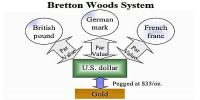Currency devaluation means the decrease of purchasing power of specific currency/ domestic currency against gold, SDR or foreign currencies that is determined by the government. Currency devaluation occurs when a country allows the value of its currency to drop in relation to other currencies.
Devaluation is a reduction in the value of a currency with respect to those goods, services or other monetary units with which that currency can be exchanged. It means there is a fall in the value of a currency. In common modern usage, it specifically implies an official lowering of the value of a country’s currency within a fixed exchange rate system, by which the monetary authority formally sets a new fixed rate with respect to a foreign reference currency, in contrast, depreciation, is used for the unofficial decrease in the exchange rate in a floating exchange system. The opposite of devaluation is called revaluation.
Consequences of currency devaluation:
- Import reduction.
- Export encouragement.
- Reduction of trade deficit.
- Checking unfair trade practice.
- Counter the foreign dumping policy.
- Encourage foreign investment.
- Increase domestic employment.
- Effects on wages and policies.
- Effects on domestic income.
- Effects on foreign prices.
Effect:
- Exports cheaper – A devaluation of the exchange rate will make exports more competitive and appear cheaper to foreigners. This will increase demand for exports.
- Imports more expensive – A devaluation means imports, such as petrol, food and raw materials will become more expensive.
- Falling real wages – In a period of stagnant wage growth, devaluation can cause a fall in real wages.
Consequences of Currency Devaluation in Developing Countries –
(a) Import reduction: Currency devaluation decreases the purchasing power of a foreign currency. So the primary effect of currency devaluation is to reduce import with the increase of currency price.
(b) Export encouragement: For the reason of currency devaluation, short terms capitals are acquired by exporting goods or services. That means it helps to increase export.
(c) Reduction of trade deficit: Generally the developing countries are to import goods more than they exported. Curren4 devaluation is a technique that can create a reverse situation by encouraging export and reducing import, which reduces the trade deficit.
(d) Checking unfair trade practice: Many countries involved in unfair trade practice in their business. Devaluation is a way that can create effective action to prevent them.
(e) Counter the foreign dumping policy: Protectionism is necessary for controlling the dumping policy. Devaluation is an effective method of Protectionism which can easily control dumping policy.
(f) Encourage foreign investors: Foreign investors invest their money when they get some facilities from a country. Devaluation provides financial advantages which encourage investors to invest their capital.
(g) Increase domestic employment: Employment opportunities are made with the increase of foreign and domestic investment in a country. Devaluation has an option to create this situation which can create job opportunities.
(h) Effects on wages and policies: Actually wages and prices are increased for the reason of currency devaluation. But it cannot be if free trade policy is made after devaluating currency.
(i) Effects on domestic income: Devaluation increases alternative industries of import-export business. And also reduces imported goods and services from abroad. This has a role in the trend of domestic income.
(j) Effects on product prices: Reducing import, increases the supply of an export-related product which decreases product prices.
(k) Political impact: A political government can be lost their popularity for taking the policy of currency devaluation at an unsuitable time.














